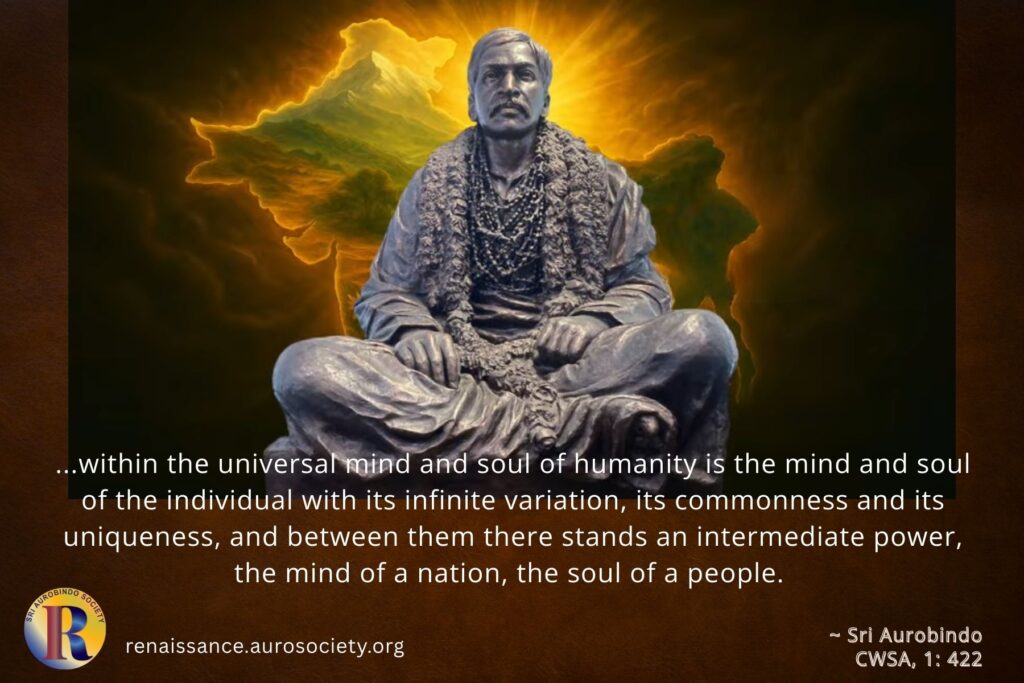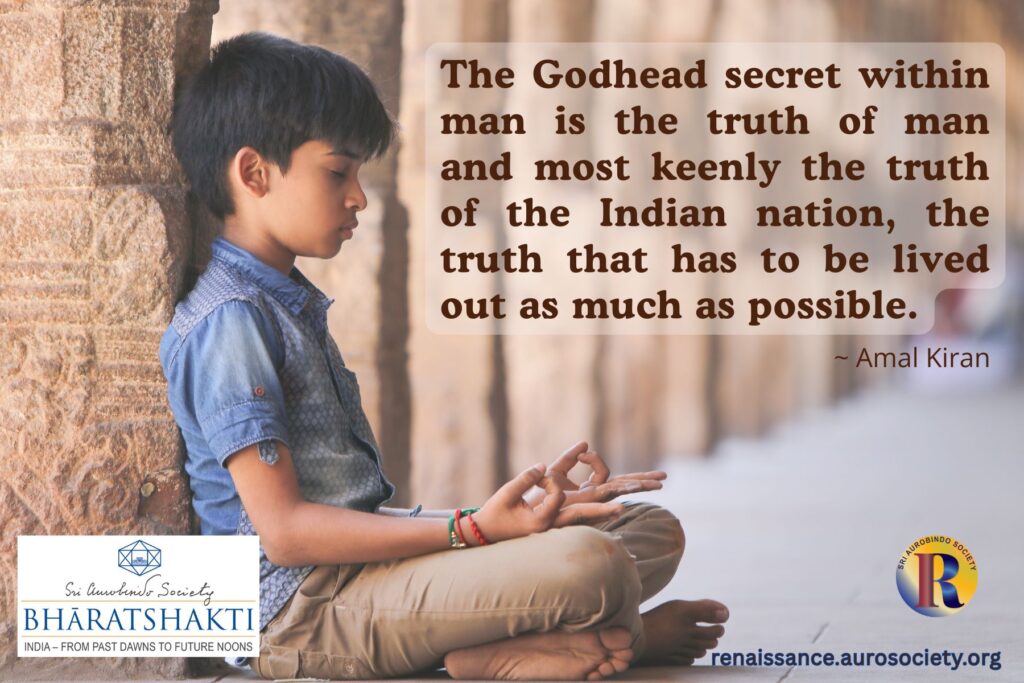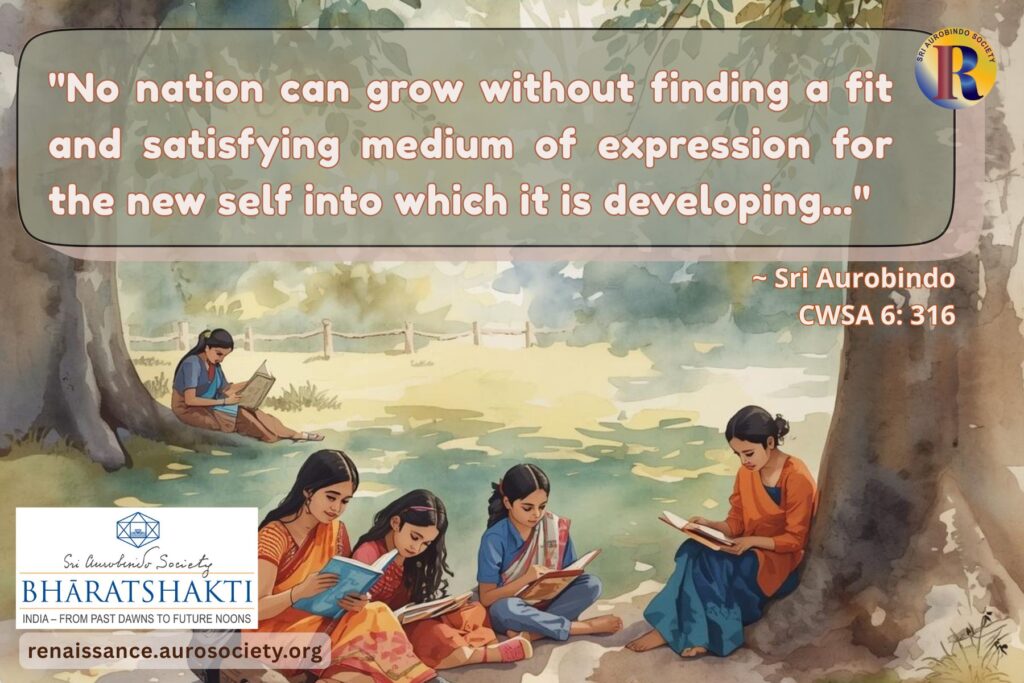Vol. III, Issue 6
Author: Shyam Kumari
Editor’s note: We feature the concluding part of the biography of Major Somnath Sharma, the first recipient of the Param Vir Chakra in independent India. Shyam Kumari, a senior member of Sri Aurobindo Ashram, has written and published this as part of a series of booklets titled ‘Our Heroes: Param Vir Chakra Recipients.’ Her aim is to make the stories of valour and courage reach a large number of Indian youth in schools and colleges.
For the purpose of online presentation, the editors have made a few minor formatting changes.

Continued from PART 3
Major Somnath was directed that as there were no enemy troops in the area, after 2:00 PM he should gradually start pulling back. At 2:00 PM, he reported to the Brigade Commander that his company was going to start moving towards the airfield. It is not clear under what impulse or instinct, Brigadier Sen directed Major Somnath to stay for one more hour. Major Som acknowledged this and said that he would start thinning out his troops at 3:00 PM.
Neither Brigadier Sen nor Major Som had any idea of what was going to happen in the next half an hour. At 2:35 PM Major Som reported to Brigadier Sen that they were being shelled lightly from the village side. He also said that in order to save the lives of innocent women and children in the village, he was not returning the fire.
While he was talking to Brigadier Sen, he observed that some people wearing long Kashmiri robes were coming towards them. These robes covered the body from neck to feet. Major Somnath challenged them. They replied that they were labourers working in the forest.
But Som got suspicious because their eyes and facial features were not like those of Kashmiris. He sent some of his men to search for them. But just then weapons came out from under their robes and the situation changed and a pitched battle started.
Suddenly the whole area started resounding with the bursting of mortar shells and bullets began to fly. At 2:40 PM about 700 strong force of tribesmen advanced from the west which brought the 4 Kumaon under heavy fire. It was obvious that this force had come to capture the airfield in order to cut off the only link which connected Kashmir with India.
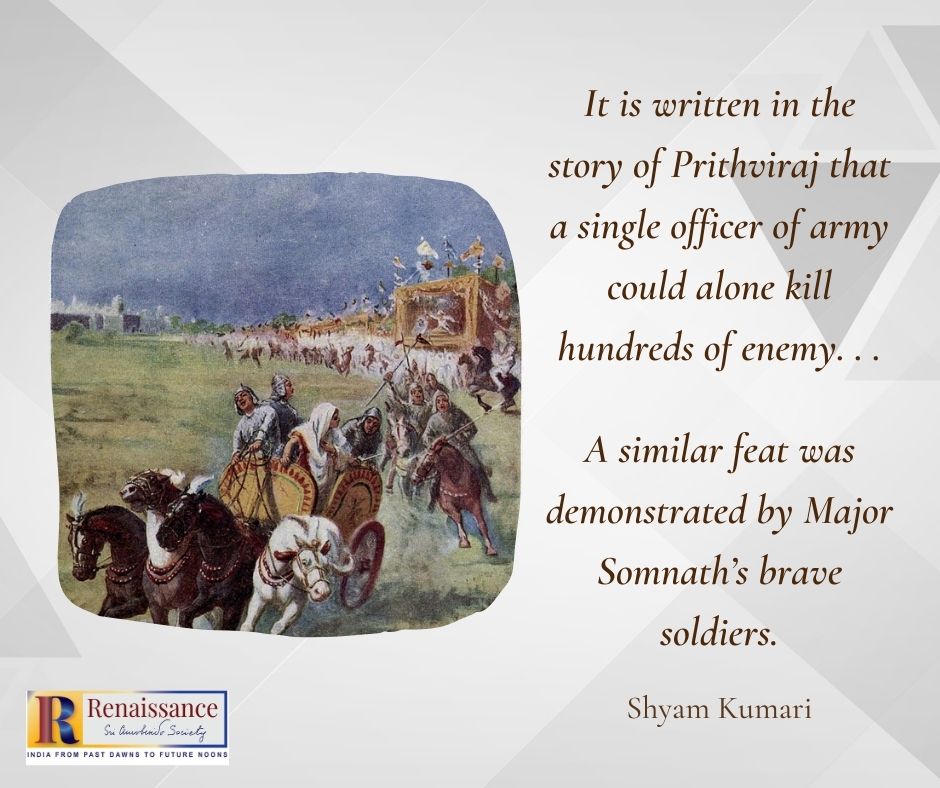
It is written in the story of Prithviraj that a single officer of army could alone kill hundreds of enemy. When Prithviraj was returning with his knights from Kannauj after abducting Princess Sanjukta, he was chased by Jaichand’s much bigger army. Then one by one, these incomparable knights of Prithviraj kept thousands of enemies at bay by laying down their lives, till Prithviraj reached Delhi safely.
A similar feat was demonstrated by Major Somnath’s brave soldiers.
Appreciating the seriousness of the situation, Somnath kept encouraging his company to fight the enemy bravely. Reporting to Brigadier Sen on the radio, he requested more men, arms ammunition and air support. Additional help was just not available. On being told so, he assured his Commander that he would not withdraw from his position. And that he would continue to fight till the last man and the last bullet.
In spite of heavy shelling and bullets flying Som ran around, spreading out markers for the air support. Then he went to his sections and in spite of his fractured arm, kept filling the magazines of the light machine guns. He was standing next to a light machine gun and reporting to the Brigade commander that the enemy was then less than 50 metres away. He said that they were heavily outnumbered and under heavy fire but they would not withdraw an inch.
In the middle of this conversation, a mortar shell burst close to him and major Somnath was killed on the spot. Brigadier Sen had ordered two fighter aircrafts to give fire support. Som’s death so enthused his men to fight in order to take revenge for their Somi Sahib’s sacrifice that they kept the ten times stronger enemy force at bay for five hours and killed a large number of them.
The men of 4 Kumaon demonstrated exceptional bravery and kept fighting even when they had had run out of ammunition. About 40 men sacrificed their lives like Major Somnath.
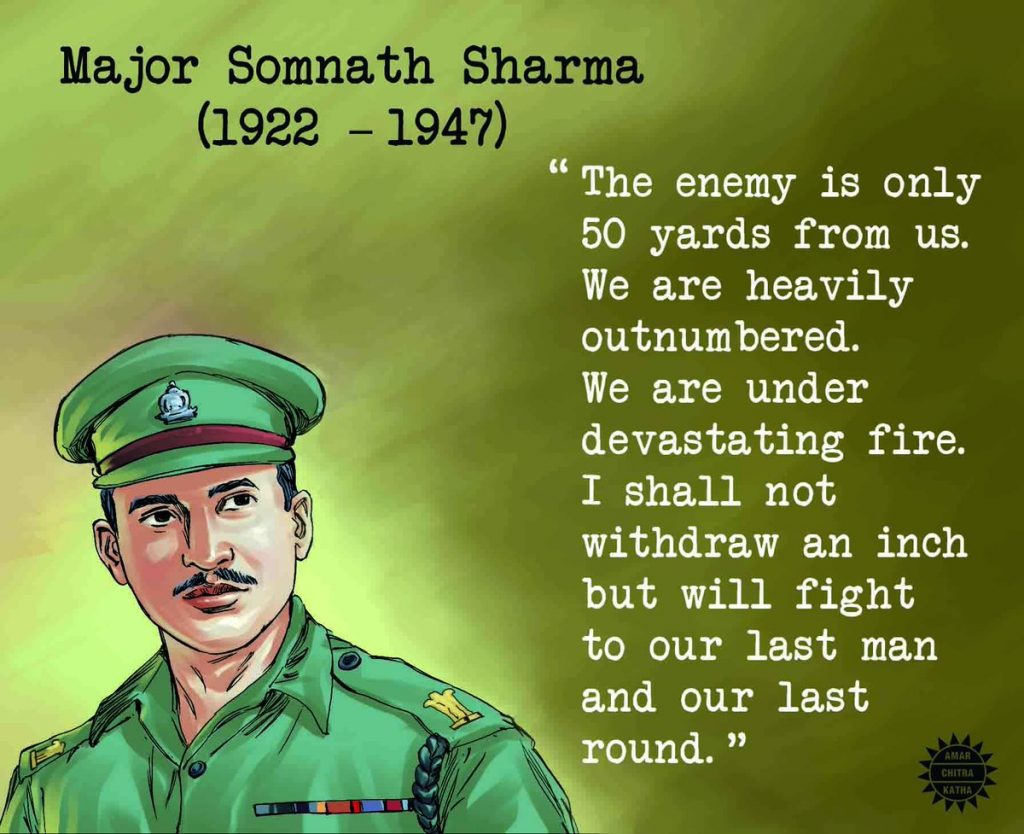
His orderly bahadur, whose life he had saved a few years before in the jungles of Burma was also killed. Ultimately, they were forced to fall back. Brigadier Sen had in the meantime sent a party of 1 Punjab to help them out.
That night the operational situation for the Indian Army was critical. If the enemy had attacked Srinagar that night, it could not have been defended. But of course, Goddess Durga was herself defending Srinagar.
The enemy did not try to take Srinagar during the night. The Goddess of War was happy, it appears, with Somnath’s sacrifice. The night passed. It was a divine force that had made Brigadier Sen order Som to delay his withdrawal by one hour. Otherwise, without being aware of the enemy’s presence, he would have come back and the enemy would have easily captured the airfield.
On 4th November, Home Minister Sardar Patel and Defence Minister Baldev Singh reached Srinagar. Considering the seriousness of the situation, they promised to send additional reinforcements and weapons. The engineers had started building bridges over streams on the route and reinforcements started arriving in Kashmir in large numbers.
The news of major Somnath’s sacrifice spread like wildfire in the Kumaon Regiment. His soldiers wanted to bring back the body of their Somi Sahib from the battle area so that he could be given a fitting funeral. In Delhi, his dear friend Major Tewari was given the delicate task of conveying the tragic news to Somnath’s family. Somehow Major Tewari controlled his own emotions and conveyed the tragic news.
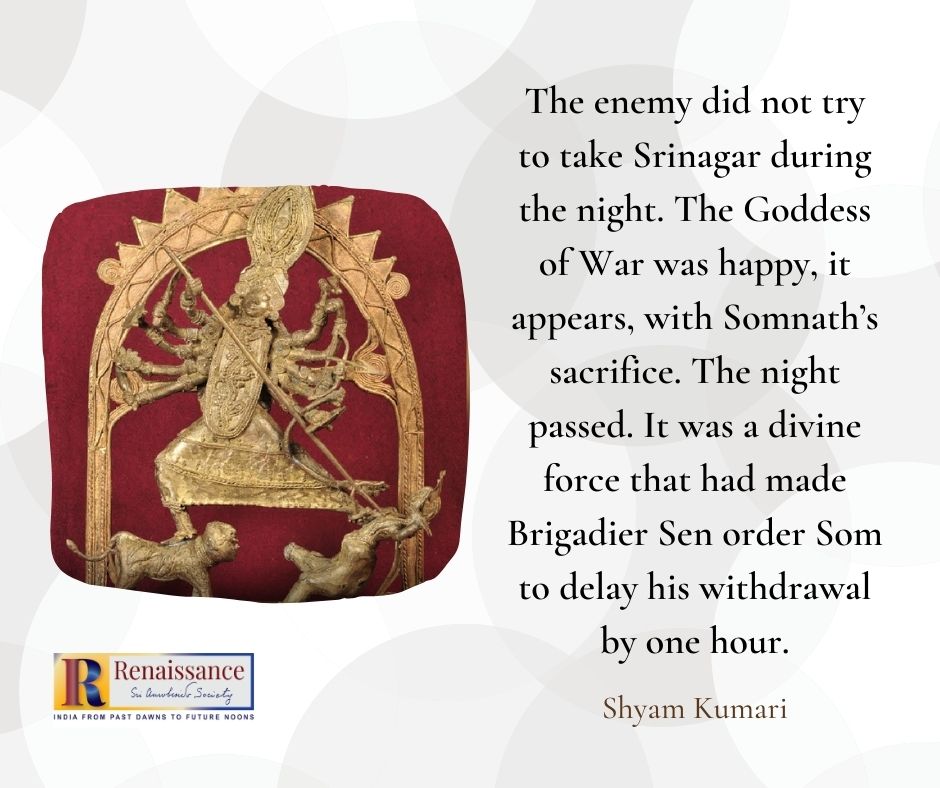
In this connection Som’s sister and mother have a sad remembrance of the occasion. Som’s father had been transferred to Ranchi. He was away from Ranchi on some duty in Calcutta. Som’s mother and sister were sitting in the verandah of their new bungalow.
A big vehicle bringing their luggage into the house collided with the gate just as a cow and its newborn calf came in front of it. The cow was saved but the calf was run over. The cow cow started moaning with a heart-rending cry. Mrs Sharma’s heart sank and she said, “Cuckoo, my heart is sinking. Something terrible has happened to my Som.” Just then they received the shattering news.
On the other side, knowing that Som’s body had not yet been recovered from the battlefield, his friend Major Tewari sought permission of his director, Brigadier Akehurst, to go to Kashmir and arrange to recover the body.
Though he was unwilling, he gave permission to Major Tewari to go because he was very fond of him. On the morning of 5th November Tewari reached Srinagar. He met Major Padam Singh who was then the officiating Commander of Kumaon battalion and then met the remnants of Som’s company, who had returned after running out of ammunition.
A number of them had been with Tewari in the Burma War. They always regarded him as Som’s brother. All of them cried when rebuked for coming without Som’s body. All of them volunteered to go with him and lead him to where Som’s body was left lying and fetch the body even though the situation there was still grim.
When Major Tewari sought the permission of Brigadier Sen to recover the body, it was flatly refused because the place was then under control of tribesmen. When he insisted, Brigadier Sen directed that if he disobeyed his order, he would be put under arrest and sent back to Delhi. The same evening Tewari returned to Delhi with a heavy heart.
Major Somnath’s body was recovered only on 7th November. The body had been blown to bits. All the bodies of Indian soldiers were found without their clothes. Those heartless tribesmen had looted, besides their weapons, even clothes and footwear of those killed. Some parts of Som’s body were covered with torn pages of the Gita (which he used to carry in his pocket) and these pages were stuck on his body with thorns.
Our troops found 200 bodies of enemy tribesmen. The Kumaon troops gave a befitting farewell to Major Somnath during a cremation on the spot. All had tears in their eyes even though they were in uniform.
The Government of India awarded him independent India’s highest award for gallantry – India’s very first Param Vir Chakra.
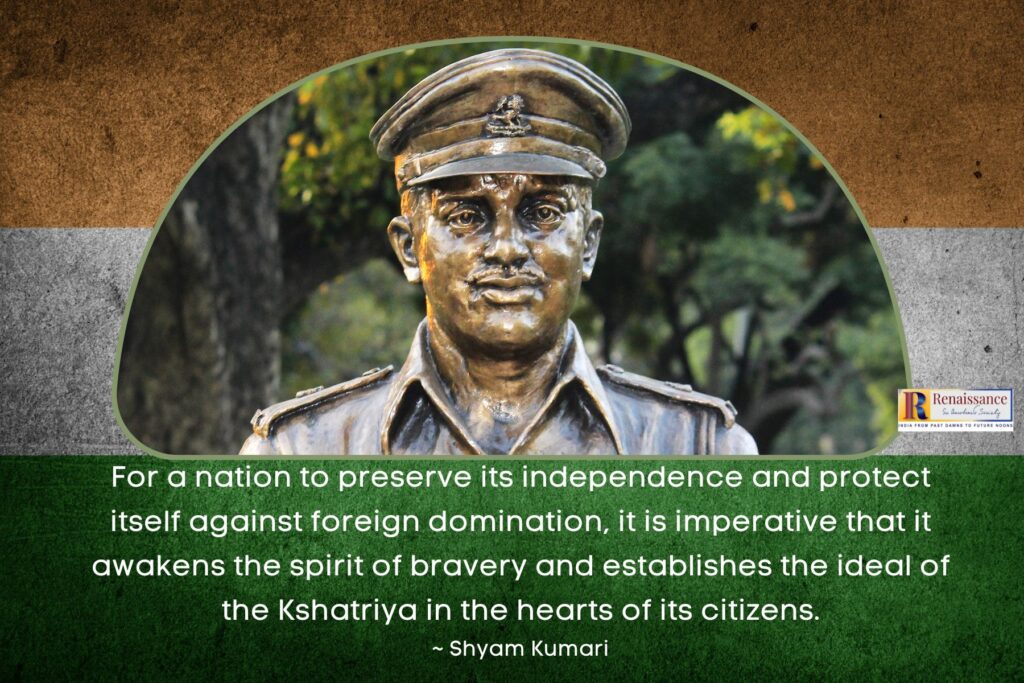
Concluded
I don’t want Pakistan to endure, made perfectly clear. Division must go—does not mean that division must be allowed to last in some form or other. Continued partition of India into two Federations one Hindu and one Muslim even if somehow connected together is no part of my idea of the Union of India.
~ Sri Aurobindo, March 1949, CWSA, Vol. 36, p. 514
Read previous parts: 1, 2, 3
~ Design: Beloo Mehra

